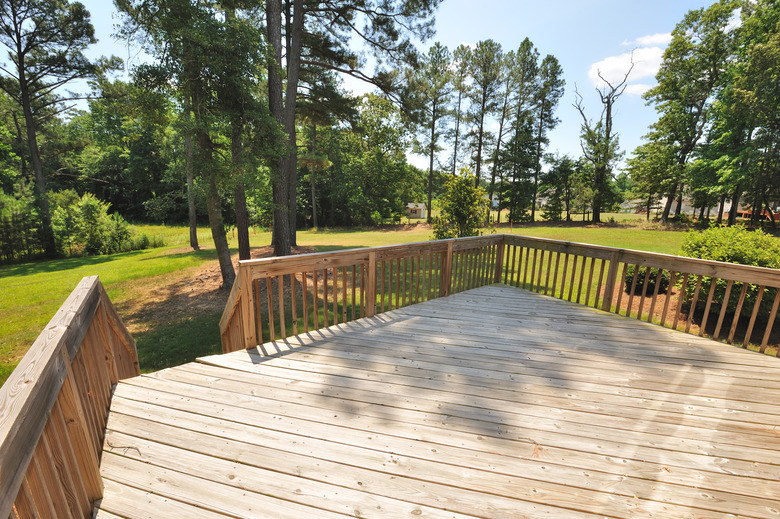Can You Build A Deck Over A Septic Field?
We may receive a commission on purchases made from links.
A raised deck allows you to enjoy the outdoors in comfort. However, when the best place to build a deck is over the septic field, rethink your plans for improving your property. A septic drain field needs sun and air circulation so the liquids can seep through the soil and evaporate into the air. A deck interferes with both functions and may shorten the life of the septic system and drain field.
Tip
A septic field needs air circulation and sunlight to function properly. A deck blocks both, making that particular site a poor choice for a deck or any other structure.
Septic Field Functions
Septic Field Functions
A septic system is a sewage treatment and disposal method used in many rural and semirural areas. The liquids and waste from sinks, showers and bathtubs, washers, and toilets move from the house into a tank, where the solids sink to the bottom, and the liquids disburse into a drain field, also known as a leach field. The drain field is a series of perforated pipes laid in gravel trenches and covered with 1 to 2 feet of soil.
As the liquids flow from the septic tank through the drain field, they slowly seep into the soil and evaporate into the air. To properly function, drain fields are installed in full-sun locations where the soil allows the liquids to evaporate or percolate into the subsoil.
Structures and Septic Fields
Structures and Septic Fields
Adding a deck or other structure over a drain field is not recommended. A deck blocks the sun and air circulation. Even if the supports are carefully installed between the leach lines, you risk damaging the field, which is an expensive mistake that affects the entire household while the system is repaired. In addition, a deck limits access to the septic system, including the concrete or polyethylene tank, which should be inspected every three years and pumped out every three to five years.
Other structures, ranging from raised garden beds to storage sheds, are not recommended. The extra soil of a raised bed and the base of a shed add a significant amount of weight over the field, which can crush the pipes and interfere with evaporation from the soil.
Plants Appropriate for Septic Fields
Plants Appropriate for Septic Fields
While a deck and other structures are a no-go for the septic field, adding a wildflower meadow or lawn is beneficial. Shallow-rooted grasses and flowers absorb the moisture and nutrients from the leach lines, enhancing its ability to disperse the wastewater into the environment. Native grasses, clover, violets, poppies, salvias, and a variety of other wildflowers to attract butterflies and hummingbirds enhance the landscape while discouraging human activities over the septic field. Scatter seeds and rake gently into the soil to avoid digging in the leach field.
You can plant deeper-rooted plants, shrubs, and some trees around the perimeter of the septic field, keeping them at least 10 feet from the lines. Add a root barrier to prevent root intrusion, which can clog and damage the lines. Select smaller shrubs and trees, such as crape myrtles, flowering cherries, and dogwoods, and plant at a distance equal to or greater than the mature height of the tree.
Plants and Trees to Avoid
Plants and Trees to Avoid
Avoid planting water-loving trees near septic fields. While most tree roots extend to approximately twice the diameter of the canopy, willow tree roots seek out water up to three to four times the normal root spread of other species. Beech, elm, and red maple trees are among the other species not recommended for planting near a septic system.
Though the drain field may be in the only sunny spot in the landscape, do not plant a vegetable garden over the lines. There is no way to ensure that the vegetables would be safe for human consumption. In addition, avoid planting bulbs in the drain field, which requires digging holes in the overlaying soil. Naturalizing bulbs planted outside of the septic field will eventually spread over the area without any additional effort on your part.
References
- United States Environmental Protection Agency: How Your Septic System Works
- University of New Hampshire Extension: Is It Okay to Plant a Garden Over a Leach Field?
- Washington State University: Spokane County Extension: Landscaping a Drain Field
- Septic Services, Inc.: Building Near a Septic Tank and Drain Field
